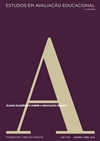Incongruências no discurso sobre qualidade da educação brasileira
DOI:
https://doi.org/10.18222/eae255720142827Keywords:
QUALIDADE DA EDUCAÇÃO • IDEB • PISA • DESEMPEÑO ACADÉMICOAbstract
Este artigo analisa, por um viés foucaultiano, as incongruências do discurso sobre qualidade da educação no Brasil a partir de dois instrumentos de aferição: o Índice de Desenvolvimento da Educação Básica e o Programa Internacional de Avaliação de Estudantes. Apesar do destaque para a necessidade de melhoria dos processos de escolarização, com avanço de discussões e sua constante inserção na agenda das políticas públicas em diversas esferas, o próprio sistema cria ciladas que podem comprometer a sua viabilização. Quando se simplifica a questão, por uma ênfase discursiva na mensuração do desempenho de alunos, corre-se o risco de responsabilizá-los (bem como a seus professores e a suas escolas), obliterando o dever do Estado em garantir uma educação de qualidade. Tal movimento é reforçado por uma leitura psicologizante do desenvolvimento e apresenta-se como um mecanismo de segregação e exclusão pedagógica.
Downloads
Downloads
Published
How to Cite
Issue
Section
License
Authors who publish in this journal agree to the following terms:
a. Authors retain the copyright and grant the journal the right to first publication, with the paper simultaneously licensed under the Creative Commons Attribution License (CC BY 4.0) license that allows the sharing of the paper with acknowledgment of authorship and initial publication in this journal.
b. Authors are authorized to assume additional contracts separately, for non-exclusive distribution of the version of the paper published in this journal (for example publishing in institutional repository or as a book chapter), with acknowledgment of authorship and initial publication in this journal.
c. Authors are allowed and encouraged to publish and distribute their paper on-line (for example in institutional repositories or on their personal page) at any moment before or during the editorial process, as this can generate productive changes, as well as increase the impact and citation of the published paper (See The Effect of Open Access).








